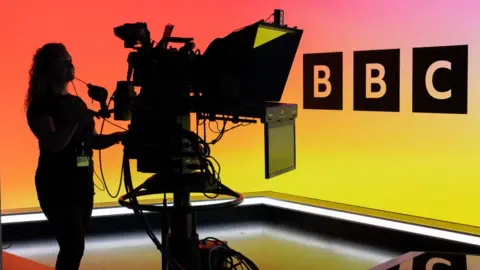**BBC Leader’s Commitment to Addressing Trust Crisis in the UK**
In a pivotal speech slated for delivery, Tim Davie, the Director-General of the British Broadcasting Corporation (BBC), intends to address the growing concern regarding the “crisis of trust” that is currently pervasive in UK society. The BBC, a prominent figure in British media, is facing the challenge of countering widespread skepticism towards information sources and public institutions, a situation that has escalated over recent years. Davie’s forthcoming remarks will underscore the organization’s proactive role in confronting these issues and reaffirming its place as a reliable source of information.
Davie plans to unveil strategies that he believes will empower the BBC to lead efforts in restoring trust among the populace. This initiative involves the expansion of BBC Verify, the corporation’s fact-checking service. Additionally, he emphasizes the need to combat misinformation and strengthen local journalism, which is essential for creating informed communities. This proactive stance represents a shift aimed not just at preserving the BBC’s legacy but at ensuring it remains relevant and influential in shaping the future of media consumption and information dissemination in the UK.
In his address, Davie is anticipated to articulate a vision for a society where trustworthy information is integral to democracy. He proposes an ideal where every child is afforded equal opportunities, creativity is harnessed for economic and social benefits, and no individual is marginalized in the digital landscape. Scheduled to take place in Salford, this speech will serve as a platform for Davie to delineate the BBC’s future under the current royal charter, which is set to expire in 2027. The upcoming years will involve extensive negotiations with the government as both parties discuss the renewal of this charter.
Through his address, Davie will assert that the BBC plays an essential role in enhancing the UK’s stature as a “global leader in trusted information.” He believes that the organization can not only support democratic processes but also aid in educational advancement, stimulate economic growth, and enhance digital inclusion. The stakes are high, as Davie notes that the very foundation of civil society and its coherence is under threat, a sentiment he describes as unprecedented in his lifetime.
Davie’s concerns reflect a broader societal shift, as recent statistics indicate a notable decline in public trust in conventional media sources. While the BBC remains the most trusted news outlet in the UK, boasting that 45% of the population considers it their most reliable resource in 2024, this figure is a significant drop from the 57% recorded a decade prior. This trend serves as a wake-up call for the BBC to innovate and adapt to changing consumer behaviors and needs.
Among the additional measures being proposed, Davie highlights a novel approach that incorporates artificial intelligence into educational services. By offering every child an automated “personal learning companion” through its Bitesize platform, the BBC seeks to leverage technology to improve educational outcomes. Furthermore, Davie expresses a desire for a systematic transition away from traditional broadcast transmissions by the 2030s, moving towards a model that emphasizes internet-only access to content. This includes considering the introduction of a dedicated streaming device aimed at those who have yet to transition to digital platforms, maintaining BBC’s commitment to accessibility.
To realize these ambitious goals, Davie plans to reaffirm the organization’s commitment to “Freely,” a service conceived to provide universal access to live television via broadband. He envisions leveraging this initiative to develop a media device that simplifies the user experience for those still relying on conventional broadcasting methods.
In summary, Tim Davie’s impending speech encapsulates the BBC’s aim to tackle the challenges posed by a declining trust in media and institutions within the UK. By adopting innovative measures, enhancing local journalism, and employing technology for educational enhancement, the BBC seeks to reclaim and strengthen its role in British society, providing a blueprint for a more informed and connected future.



